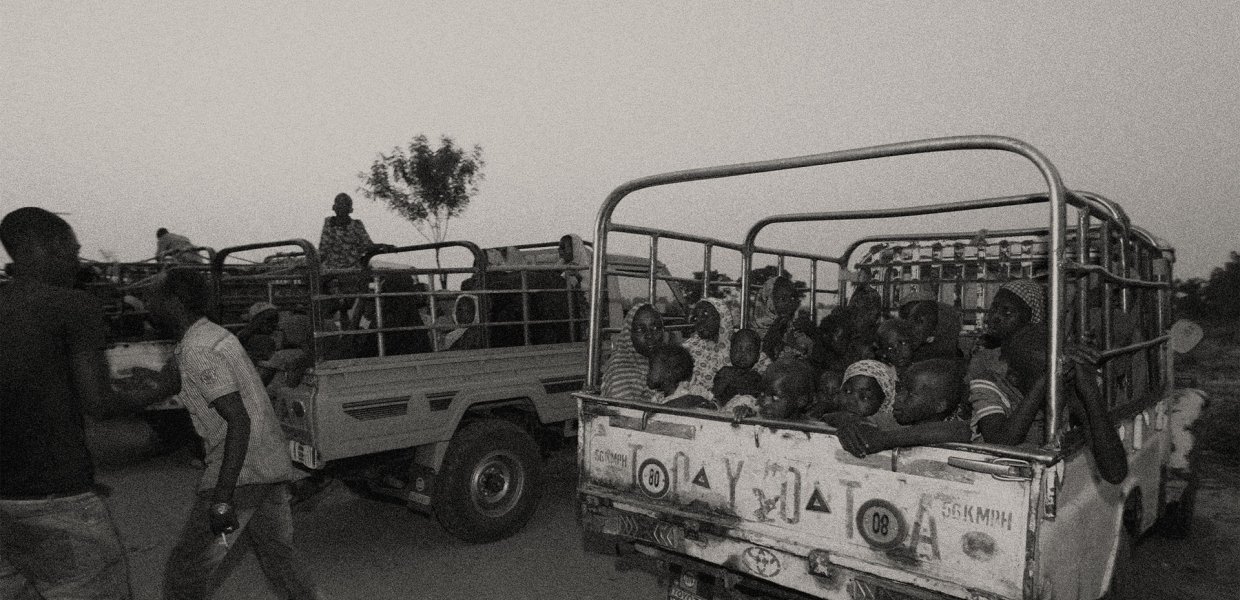The content of this article includes sensitive topics, including sexual violence, that may be difficult for some people to confront. Some individuals may choose to not proceed.
In 2019, Reuters correspondent Paul Carsten was speaking with a human rights contact about military abuses against civilians in Nigeria’s northeast site of a brutal war against Islamist insurgents. He wondered aloud about the women who had been liberated by the army after being abducted, sexually enslaved and impregnated by insurgents.
“What did the soldiers do with these women,” thought Carsten, “perform abortions?” What happened to their children?
Carsten hit upon what would prove to be an extraordinary story: The army for years had been running a mass, secret abortion program, forcing the termination of at least 10,000 pregnancies among women and girls, many of whom had been abducted and raped by militants.
Carsten — joined by reporters David Lewis, Reade Levinson and Libby George — painstakingly assembled evidence of other horrifying abuses: Children as young as a few months old were being targeted for death. Suspected of being relatives or allies of Boko Haram, minors were regularly murdered by the military — shot, smothered, poisoned — sometimes in front of their mothers.
For their resulting four-part series, “Nightmare in Nigeria,” the Reuters team has won the 2023 Selden Ring Award for Investigative Reporting. The annual award, one of the foremost honors in investigative journalism, has been presented by the USC Annenberg School of Journalism for 34 years. The $50,000 prize honors investigative journalism that informs the public about major problems and corruption and yields concrete results.
“The imperative for ethical, intellectually rigorous, intrepid reporting that surfaces injustice and holds those in power accountable has never been greater,” USC Annenberg Dean Willow Bay said. “We are deeply proud to have partnered with the Ring Foundation to once again recognize the very best in investigative journalism.”

Carsten, Lewis, Levinson and George’s reporting was undertaken at great risk, requiring months and, in some cases years, of trust-building with 33 women and girls who survived abuse, as well as clandestine conversations with healthcare workers, soldiers and armed guards who turned over military documents and hospital records. These witnesses shared their stories despite credible threats of incarceration or violence from the military, profound trauma and practical obstacles such as the need to travel long distances for their meetings. Most will never be recognized for their courage; they felt they could not risk being named.
Drawing on more than 40 witness interviews, satellite imagery and documentation from security-force members, the Reuters team meticulously documented six incidents in which at least 60 children died. The series’ print pieces and videos created a definitive public record of atrocities that might otherwise have gone unacknowledged.
The coverage also interrogated the role of the international community in facilitating these abuses, particularly the U.S. and U.K. governments, which have provided considerable financial backing to the Nigerian military. The Reuters series’ impact has been profound, generating calls for investigation from the U.S., British and German governments and the U.N. Secretary-General.
“A prestigious award like the Selden Ring is a great personal honor for our reporters, but it’s also a vehicle to bring attention to their work and amplify its reach and impact,” said Julie Marquis, an investigative editor who co-edited the series. “Calling attention to investigative journalism serves as a reminder to people in power that they can’t assume they can escape scrutiny for their actions, in any corner of the world.”
The judges commended the series for “creating a space where the voices of families who endured grave harms – perpetrated secretly and systemically by their own government – could be heard.”
“The judges had a very challenging task and we are beyond grateful for their hard work as they narrowed down a highly competitive collection of 86 entries, representing the very best of investigative journalism over the past year," said Gordon Stables, director of USC Annenberg’s School of Journalism. “Not only are members of the panel accomplished journalists who have made a substantial public impact in their own communities, they are dedicated professionals who continue to demonstrate a commitment to elevating the work of their peers."
Since 1989, the Ring Foundation has partnered with the USC Annenberg School of Journalism to present the Selden Ring Award for Investigative Reporting. The $50,000 annual award was established with the support of Southern California businessman and philanthropist Selden Ring. It underscores the critical importance of investigative journalism in today’s society.
This year’s judging panel included: 2013 winner Alexandra Zayas, Deputy Managing Editor, ProPublica; returning judges Sewell Chan, Editor in Chief, The Texas Tribune and Pulitzer Prize-winning reporter Wesley Lowery; with first-time judges, Astead Herndon, National Political Reporter, The New York Times; Sarah Stillman, staff writer, The New Yorker; Manny Garcia, Executive Editor, the Austin American-Statesman; and Harriet Ryan, investigative reporter, The Los Angeles Times.
In addition to naming the winner, the panel of judges also recognized the work of two finalists.
New York Times, “How Hasidic Schools Reap Millions But Fail Students”
The judges praised the “high degree of difficulty” in this investigation of abject educational failures at taxpayer-funded schools run by the insular and politically powerful Hasidic community in New York State. The series revealed that instruction for the 50,000 students was so lacking — meager English and math, almost no science or social studies — that 99% of those who took state standard tests failed them. Despite these screaming deficiencies, public money — more than $1 billion in the past four years — continued to pour into these institutions. Jurors saw great courage in the decision to tackle a religious and culturally fraught topic on behalf of children when many in the community and government refused to do so. As one judge remarked, “If the New York Times hadn’t done this story, it wouldn’t have been done.”
Los Angeles Times, “Legal Weed, Broken Promises”
Of all of the states that could have served as a testing ground for the legalization of marijuana, California, with progressive business practices and a record of regulatory guardrails, might have seemed the safest of bets. And for years, its transition to legal weed was perceived to be a national success. The Los Angeles Times, in a wide-ranging investigation, shattered this fiction from every angle, using technology, lucid writing, and courageous reporting to lay bare a netherworld of off-the-grid grow operations and black market storefronts. Instead of rectifying the ills of the war on drugs and lifting up entrepreneurs, the new system was a boon to corrupt politicians and organized criminals. Honest farmers lived in fear of their outlaw competitors. Dozens of vulnerable workers died. The investigation’s impact was swift and profound: tens of thousands of people who had languished with old marijuana convictions will have their records cleared; regulators intend to crack down on illegal operations with a focus on labor exploitation and human trafficking. Judges commented that the many states that have followed California down the path to legal weed will benefit from this cautionary tale.
